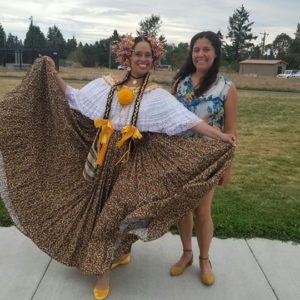As an organization, we value equity and engaging communities in culturally sensitive ways. Our Communications Director, Sully, reflects on the importance of the words we use in our efforts to be an equitable and inclusive organization.
As a communications professional and an advocate for racial equity, I know that words have power. I carefully consider what every word I write for A Way Home Washington conveys about our organization’s values. I will always write about young people experiencing homelessness – not about “kids” or “the homeless” – because our values reject adultism and dehumanization. That care went into choosing the word Latinx for our organizational voice.

I’ve spent a long time thinking about what it means to be Latinx. I was born and raised in Panama, and for the first nineteen years of my life, I was simply Panamanian. I moved to the United States as a college student, and I remember the exact moment when I realized that here, my identity was more complicated. My university offered a course called Hispanic Marketing, and a classmate asked me if I could complete a survey for US Hispanics to help her with an assignment for that course. As an international student, I did not feel that I fit in that label. But my classmate assured me that anyone living in the United States with ties to Latin America was considered a US Hispanic.
Since then, so many layers and nuance have been added to the way I identify. In my heart, I will always be Panamanian. But after ten years in the United States, I’ve learned that when people of color stand together, we are much stronger in our fight for justice. So I also identify as an immigrant, a person of color and a Latinx person.
I chose the word Latinx for myself because it aligns with my values. It is a word that was created by the community, unlike Hispanic, which was created by the US government. Spanish is a gendered language where every noun is either masculine or feminine, including nouns used to refer to people like Latino and Latina. When there is a group of mixed gender, even if it is a group of 9 people who identify as female and one who identifies as male, the group is always referred to as masculine. Using Latino to refer to the whole community centers masculinity, while Latinx decenters masculinity. Latinx also makes room for all gender identities and expressions since it is neither a masculine nor a feminine word. In a culture where LGBTQ+ identity is still stigmatized, I find it very important to stand with people who identify outside the gender binary. For all these reasons, it also felt right to choose Latinx for A Way Home Washington.
Now, it’s important to also recognize that the Latinx community is made of people with a wide variety of experiences, opinions and stories. That means that there is no community consensus on how to label our identity – look no further than the comment thread on any community website that uses the word Latinx to see the full range of emotion it stirs up. When it comes to individual people, we should always refer to them using the words they choose for themselves. But when we talk about the whole community, I choose the word that is most inclusive.
Racial equity is a journey with lots of learning along the way. That means we always need to be open to hearing different ways of thinking. Recently, I’ve been reflecting on the idea that words like Latino and Latinx erase the indigenous roots of so many people from Latin America. If a few years from now, the community creates a new term that is even more inclusive than Latinx, my understanding of my identity and my community may continue to evolve, and the words I choose may change. Until then, I continue to be fiercely, proudly, loudly Latinx.

I appreciate your story, experiences, and you, Sully!
Thank you, Sam! It means a lot to me that we work in a sector where these conversations are appreciated.